Akanfo (Akan people) in the Takyiman and Wankyi (Wenchi) areas of Ghana, West Afuraka/Afuraitkait (Africa) celebrate the festival called Apoo. This festival is also called Alie in the Sefwi area (including Sefwi Wenchi) of Ghana and is celebrated by the Akanfo of the Asona Abusua (Asona clan) in that region.
Apoo is from the root 'po' meaning 'to reject'. The Apoo Afahye (Apoo festival) is a 13-day observance which is dedicated to the ritual purging of spiritual, cultural and social ills in self and society. Apoo Afahye is dedicated to the eradication of disorder and its purveyors, human and non-human, physical and non-physical, individual and communal.
Aakhuamuman Amaruka Atifi Mu (Aakhuamu Nation in North America) observes Apoo Afahye for 13 days annually. Our observance is centered around fefewbere (spring). We take advantage of the shift in energy which occurs during what is called the vernal or spring equinox. Our Apoo Afahye in 13025 (2025) will take place during the gregorian calendar dates of March 13 through March 25.
No non-Afurakani/non-Afuraitkaitnit (non-African/non-Black) individual or group can be part of nor participate in an Apoo observance, nor any other Afurakani/Afuraitkaitnit (African) Ancestral Religious observance for that matter.
[*It must be noted that the whites and their offspring are promoting the false notion that Apoo Afahye includes "men dressing as women and vice versa". This practice is absolutely not part of Apoo Afahye. It is only those Afurakanu/Afuraitkaitnut (Africans) in Ghana who have been infected by white pseudo-religion and ill-culture who have recently introduced this infection in various aspects of their lives including a perversion of Apoo Afahye. Dissexuality (homosexuality) and its varied expressions and inclinations, including cross-dressing, is not part of any Afurakani/Afuraitkaitnit (African) Ancestral Culture. Listen to our MAAKHERU audio webcast dealing with this subject in detail here: Morality and the insanity of dissexuality (homosexuality) as defined in Afurakani/Afuraitkaitnit Ancestral Religion]
Ritually, in Aakhuamuman Amaruka Atifi Mu, Apoo Afahye includes the execution of akraguare (odwaree no kra, 'soul-washing') for seven days leading up to the first day of fefewbere (spring equinox) followed by offerings to the Nananom Nsamanfo and to Asaase Afua and Asaase Yaa, the Two Earth Mother Abosom. Individual and communal purging/purification, inclusive of specific dietary observances (fasting, cleansing) and ABOA NKWA (Ritual Movement) are observed, which serve to recalibrate the oman (Afurakani/Afuraitkaitnit (African) nation, community) that we may enter the second half of our year with a purified and unified focus having reaffirmed the seven root mbe which we seeded during our OBRA DWIRA observance at the beginning of the year. As the adennen, balance, of the body of Asaase Afua and Asaase Yaa is renewed, so do we renew the balance within our physical, spiritual and communal bodies during this time as Afurakanu/Afuraitkaitnut (Africans~Black People). It is also during this time near the equinox that we have our AKYISAN - Afurakani/Afuraitkaitnit (African) Ancestral Religious Reversion Conference.
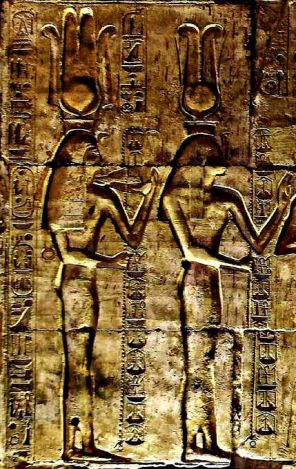
The majority of Akanfo (Akan people) celebrate the New Year at some point within the gregorian calendar months of August, September or October. For certain groups of Akanfo, the New Year celebration is called Odwira (oh-jee'-rah).
Odwira is celebrated for 7 days in some areas and 40 days in other areas. Odwira is a term meaning purification. At the end of one cycle/year and the beginning of a new cycle/year it behooves us to purify ourselves physically and spiritually. It is a time to re-establish the values of our Ancestral Culture and re-dedicate ourselves individually and as an Afurakani/Afuraitkaitnit (African) community to our individual and collective nkra/nkrabea (Divine function) in Creation. Through Odwira, we enter the new year/cycle with a renewed spirit, a renewed drive to accomplish and a renewed focus to eliminate all obstacles to our success whether they be physical (including human) and/or non-physical.
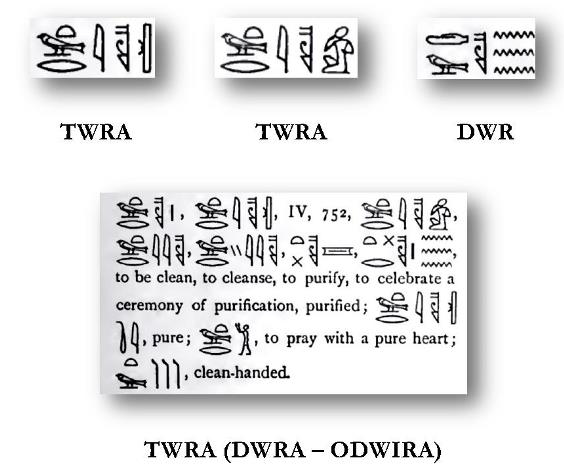

The Akan term odwira is from the root dwira meaning to purify, to cleanse. The noun odwira thus means purification. As a descriptive title, Odwira is the name for the New Year observance for millions of Akan people. As we can see above, the term dwira is directly derived from our Ancestral language of Khanit (Nubia) and Kamit (Egypt). The term spelled in the medutu (hieroglyphs) as twra or dwra, dwr means to be clean, to cleanse, to purify and to celebrate a ceremony of purification. The Akan celebration of the New Year as a time for purification, Odwira, is thus an unbroken tradition from ancient Khanit and Kamit to the Akanfo of West Afuraka/Afuraitkait (Africa) and the Akanfo of Aakhuamuman Amaruka Atifi Mu.
Aakhuamuman Amaruka Atifi Mu (Aakhuamu Nation in North America) celebrates Odwira for 7 days annually. The last day of our observance is our New Year's day. This always occurs on the first full day of powbere (Atem/Atemet or autumn). We take advantage of the shift in energy which occurs during what is called the autumnal or fall equinox. The manner in which we approach our unique form of the Odwira celebration, which we call OBRA DWIRA NANANOMSOM - A Life Purification Ancestral Service/Celebration, reflects our Ancestral connection to the Akanfo of ancient Afuraka/Afuraitkait (Africa), yet also the unique experiences we have gained since we have been separated from the Akanfo of Afuraka/Afuraitkait (Africa). Akan Ancestral Religion is called Hoodoo. Obradwira Nananomsom is thus the Hoodoo New Year as well. The phrase huru dwira highlighted above means "to initiate through ritual" (huru) the Odwira.
The term huru in the Akwamu dialect is enunciated with the rolling 'R', tongue tapping the roof of the mouth once. It is thus phonetically "hudu" (hoodoo). The related term odwirahuruda is the da (day) that Odwira is ritually invoked - huru (hoodoo). In North America this is Odwira Hoodoo Day, the beginning of our seven-day New Year observance.

Afurakanu/Afuraitkaitnut (Africans) who are descendant of those who were taken outside of Afuraka/Afuraitkait (Africa) have received invaluable insight by engaging this part of the world, "losing" and "reclaiming" our Ancestral culture - Sankofa - and seeing our absolute enemies--the whites and their offspring--for who and what they truly are. We therefore institutionalize this insight, this experience, as part of the accumulated wisdom of our Ancestry. The values of our culture are ritually re-affirmed in a major way annually during the seven days of OBRADWIRA under the guidance and influence of the Nananom Nsamanfo, our Spiritually Cultivated Afurakani/Afuraitkaitnit (African) Ancestresses and Ancestors of our direct blood-circles and the Akradinbosom, the Abosom (Deities) Who govern the solar, lunar and planetary bodies which define the seven-day Akan week, and from Whom all Akanfo derive our akradin (soul-names or 'day'-names).
The seven days of our Odwira observance revolve around the seven root mbe (proverbs) of UAB-ODWIRA Pa Nsaman Atemmu. UAB-ODWIRA is a specific body of knowledge founded upon the seven mbe (proverbs) which stream from the Akradinbosom and whose value was/is brought into fruition by our Nananom Nsamanfo. They serve as an example for us and a standard by which to measure our development individually and as an oman - an Afurakani/Afuraitkaitnit (African) nation/community. See UAB-ODWIRA for the seven root mbe (proverbs) delineating these values.
No non-Afurakani/non-Afuraitkaitnit (non-African/non-Black) individual or group can be part of nor participate in an Obra Dwira Nananomsom observance, nor any other Afurakani/Afuraitkaitnit (African) Ancestral Religious observance for that matter.
Note: Most Akanfo celebrate the New Year at some point during the gregorian calendar months of August, September or October. Only with the advent of the corruption of our culture by the whites and their offspring did some Afurakanu/Afuraitkaitnut (Africans) begin the foolish practice of claiming that the New Year begins months later in the dead of winter on January 1.
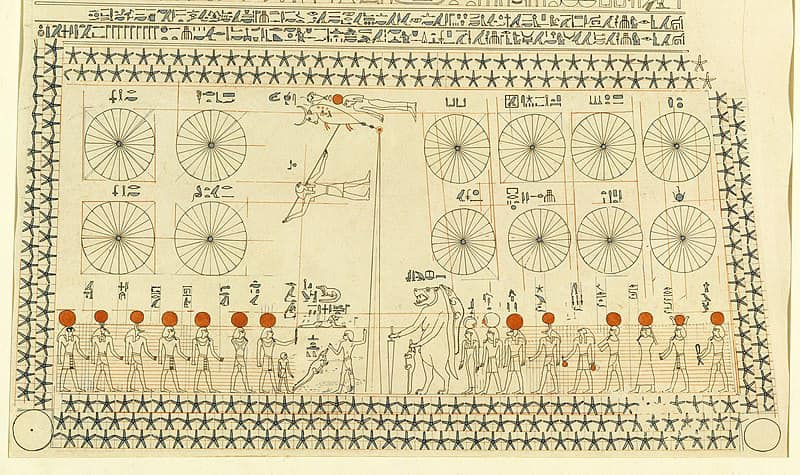
Original calendar from the ceiling of Senenmut, 18th dynasty, Kamit (Egypt)
Afurakanu/Afuraitkaitnut do not base our observance of time on a fictional character from the pseudo(fake)-religions of the whites and their offspring. The cycle we adhere to is the Afe Kesee (Great Year) which is the cycle wherein the equinotical point of Owia (the Sun) takes approximately 26,000 years to move through all of the constellations which cross the ecliptic (the so-called zodiacal signs of which there are 13 - not 12). We are in the midst of the present-day Afe Kesee, hence the years beginning with 13000.
Aakhuamuman Amaruka Atifi mu will celebrate Obra Dwira Nananomsom, 13026 during the gregorian calendar dates of September 16th through September 22nd. Note that September 22nd (2025) is our New Year's day--the first day of Atem/Atemet (autumn) and the first day of the year 13026 [100 days prior to the gregorian 'new year' of january 1, 2026].
See the videos below wherein we examine the nature and practice of our OBRADWIRA observance. The first video was from September 11, 13022 (2022) wherein we examined the structure of our seven-day observance. The subsequent set of seven videos were from our livestream the following week for each of the seven days of the observance that year, September 17th - 23rd. We discuss the ebe (Divine wisdom teaching) of each day, the cosmology undergirding it and its application to our collective function as Afurakani/Afuraitkaitnit (African) people:
See: Akwasidae and Awukudae

ODWIRAMAN
Purified Nation - Afurakanu/Afuraitkaitnut (Africans~Black People) in the West
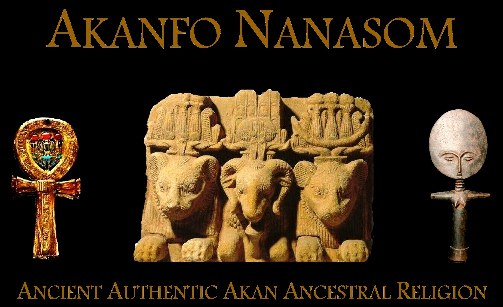
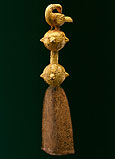
SAN
(return)